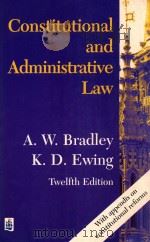《CONSTITUTIONAL FUNCTIONS AND CONSTITUTIONAL PROBLEMS OF INTERNATIONAL ECONOMIC LAW》
| 作者 | DR.ERNST-ULRICH PETERSMANN 编者 |
|---|---|
| 出版 | UNIVERSITY PRESS |
| 参考页数 | 258 |
| 出版时间 | 1991(求助前请核对) 目录预览 |
| ISBN号 | 2827105330 — 求助条款 |
| PDF编号 | 813357438(仅供预览,未存储实际文件) |
| 求助格式 | 扫描PDF(若分多册发行,每次仅能受理1册) |
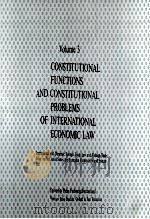
FIRST PART: INTERNATIONAL ECONOMIC TRANSACTIONS, INTERNATIONAL ECONOMIC LAW AND INTERNATIONAL ECONOMIC ORDER1
Ⅰ. International Economic Transactions and International Economic Law1
1. International Economic Transactions: Types and Legal Interrelationships1
2. International Economic Transactions as Welfare-Increasing Exchanges of Goods, Services and Capital4
3. International Economic Transactions as Agreements on Welfare-Increasing Exchanges of Property Rights8
4. National and International Liberal Economic Rules as Welfare-Increasing Agreements for the Reduction of International Transaction Costs10
5."International Economic Law" as a Layered System16
6. Need for a Comprehensive Analysis of the Law of International Economic Relations19
A) Need for a Comprehensive Legal Analysis19
B) Need for an Economic Analysis24
C) Need for a Political Analysis26
Ⅱ. Historical Evolution of International Economic Law into a "Stratified Order"27
1. Basic Functions of International Economic Rules27
2. Taxonomy of Trade Policy Instruments30
3. Historical Evolution of International Economic Law: A Brief Survey31
3. Historical Evolution of International Economic Law: A Brief Survey31
4. Legal Evolution of International Economic Organizations since World War II: Some Comparative Legal Aspects35
5. International Economic Law as a "Stratified Order"39
A) Interdependences between Private and Public National Trade Law: A Historical Retrospective41
B) Interdependences between Public National and International Trade Law43
C) Interdependences between Private and Public International Trade Law45
Ⅲ. International Economic Order and International Economic Law49
1. Different Kinds of "Order" and of Law49
2. The Notion of "International Economic Order"52
3. Basic Elements of an Economic Theory of International Economic Order54
A) Need for Decentralized Regulatory Mechanisms54
B) The Economic Theory of Optimal Intervention57
C) Efficient Allocation of Resources58
D) Coordination and "Dynamic Stability"59
E) Equitable Distribution60
4. Basic Elements of a Legal Theory of International Economic Order61
A) Need for an "Economic Constitution": The "Constituent" and "Regulative" Principles Proposed by the "Freiburg School" of "Ordo-Liberalism"63
B)"Constituent" and "Regulative" Principles of the International Economic Order66
C) Conclusions: A Pluralistic International Economic Order must be Based on Liberal Principles68
Ⅳ. Need for an Economic Analysis of International Economic Law73
1. Economic Analysis of Law: Concepts and Problems73
2. Positive "Result-oriented" Economic Analysis of International Economic Law77
3. Normative "Rule-oriented" Economic Analysis: The Ranking of Foreign Trade Policy Instruments81
4."Social Justice" and the "New International Economic Order"85
5. Separating Economic and Legal Issues92
SECOND PART: PAST AND PRESENT TRADE MERCANTILISM AS "GOVERNMENT FAILURE" AND "CONSTITUTIONAL FAILURE"96
V. Need for Constitutional Restraints on Government Powers to Tax and Restrict the Foreign Trade Transactions of Domestic Citizens: Trade Mercantilism as "Government Failure"96
1. The National Self-Interest in Trade Liberalization96
2. Characteristic Features of the "New Trade Mercantilism"100
A) Recourse to Disproportionate, Mutually Harmful Policy Instruments103
B) Return to "Power-oriented", Bilateral and Sectoral Trade Policies104
C) Administrative "Grey Area Trade Restrictions" without Effective Parliamentary and Judicial Control106
D) Lack of Transparent, Democratic Policy-making in the "Public Interest"108
E) Surreptitious Income Redistribution for the Benefit of Special Interests110
3. Why Trade Is Not Free and Why Trade Liberalization Meets Resistance112
A) The National Interest in Trade Liberalization vs. Domestic Group Interests in Trade Protection112
B)"Protectionist Biases" in Domestic Decision-making about Trade Policy113
a)Unbalanced Political Representation of the Public Interest in Liberal Trade115
b)The "Political Market for Protectionism"116
c) The "Conservative Social Welfare Function"118
C) How Can the Political Resistance to Trade Liberalization Be Overcome?120
4.Lessons from the Past: Common Features of Past and Present Trade Mercantilism122
A) Economic Inefficiency and Waste122
B) Prevalence of Special Interests over the General Public Interest 123
C) Lack of Effective Protection of Individual Freedoms and Property Rights124
D)"Unjust" Rules127
E) Bureaucratic Dirigism, "Pretense of Knowledge" and Non-transparent Policy-making128
F) Conflict-oriented Foreign Power Policies131
5. Conclusions: The Need to Tame the Mercantilist Leviathan through Constitutional Rules131
A) The Need to Protect Individual Rights in the Trade Policy Area132
B) The Need to Define the National Self-interest in Liberal Trade and Rule of Law133
C) The Need to Limit the Scope of Trade Policy Powers135
D) The Need to Regulate the Proportionate Use of Trade Policy Instruments137
Ⅵ. Insufficient Constitutional Restraints in National Laws and European Community Law on Government Powers to Tax and Restrict Foreign Trade: Trade Mercantilism as "Constitutional Failure"139
1. The Increase in Government Discretion in the Conduct of Foreign Economic Policy139
2. Insufficient Constitutional Guarantees in Domestic Laws for a Transparent, Non-Discriminatory and Proportionate Use of Trade Policy Instruments142
A) The Foreign Trade Law of the United States: Some Constitutional Problems143
a) Limited Government?145
b) Separation of Powers?148
c) Limited Delegation of Powers?151
d) Effective Judicial Review?152
e) Federalism154
B) The Foreign Trade Law of the European Community: Some Constitutional Problems155
a) Limited Powers?156
b) Trade Liberalization "in the Common Interest"(Article 110 EEC Treaty)?159
c) A "System Ensuring that Competition in the Common Market is not Distorted" (Article 3 EEC Treaty)?162
d) Democratic Decision-making?164
e) Legal Certainty and Rule of Law?167
f) Judicial Protection of Individual Freedoms of Trade?168
3. Insufficient Procedural Guarantees in US Domestic Laws and in European Community Law for the Public Choice of Transparent, Non-Discriminatory and Proportionate Trade Policy Instruments175
A) Social Decision-making Processes for the Reconciliation of Individual Interests and the "Public Interest" in Pluralistic Democracies175
B) Protectionist Biases in the Organization and Political Influence of Domestic Interest Groups: Empirical Evidence178
C) Protectionist Biases in Democratic and Parliamentary Decision-making183
D) Protectionist Biases in Bureaucratic Decision-making: The Declining Role of the Limited Delegation Doctrine188
E) Protectionist Biases in Judicial Decision-making: Judicial Abdication vis-a-vis Discretionary Grey Area Trade Restrictions195
4. Conclusion: Trade Mercantilism as a "Constitutional Failure" of Representative Democracy205
THIRD PART: CONSTITUTIONAL FUNCTIONS OF LIBERAL INTERNATIONAL ECONOMIC RULES210
Ⅶ. Constitutional Functions of Liberal International Trade and Monetary Rules210
1. Notion and Functions of "Constitutional Rules"210
A) The Reason of Rules210
B) Need for and Functions of Constitutional Rules211
C) Means of Constitutional Constraint214
D) How to Provide International "Public Goods" without International Governments? The Need for Internationally Agreed Restraints on National Policy Instruments with Harmful Effects Abroad217
E) International and Domestic Constitutional Functions of Liberal International Trade Rules218
2. Constitutional Functions of Liberal International Trade Rules: Basic Principles of GATT Law221
A) The GATT Principle of Transparent Policy-making222
B) The GATT Principle of Rule-oriented Policy-making224
C) The GATT Principles of Non-discriminatory Market Access226
D) The GATT Principle of the Use of Uniform and Proportionate Policy Instruments230
E) The GATT Principle of Fair Competition232
F) The GATT Principles of "Due Process" and Judicial Protection of Individual Rights234
G) The GATT Principle of National Economic Sovereignty236
H) The GATT Principle of Reciprocity237
I) The GATT Principle of Non-reciprocal and Preferential Treatment of Less-developed Countries241
3. Constitutional Functions of Liberal International Monetary and Financial Rules: Basic Principles of the Law of the International Monetary Fund and the World Bank245
A) The Principle of Separation of Policy Instruments245
B) The Principles of Transparent and Rule-oriented Policy-making245
C) The Principle of the Use of Non-discriminatory and Proportionate Policy Instruments252
D) The Principle of Protection of Property Rights255
E) The Principle of National Economic Sovereignty257
4. Constitutional Functions of Multilateral Institutions and Procedures: The Example of the "Bretton Woods System"259
A) The Bretton Woods Agreements as "Living Constitutions"and "Legal Systems"260
B) The Bretton Woods Agreements as Institutional Framework for Multilateral Supervision, Negotiations and Dispute Settlement266
5. The "Constitutional Dilemma" of Liberal International Trade Rules274
A) Liberal International Trade Rules as a Self-imposed "Constitutional Restraint" on the Government Powers to Restrict Individual Freedoms of Trade274
B) Not All International Rules Serve Constitutional Functions276
C) Inadequate Constitutional "Checks and Balances" at the International Level: The Risk of Intergovernmental Collusion277
D) Inadequate "Domestic Law Effects" of International Obligations279
FOURTH PART: POSSIBILITIES OF "CONSTITUTIONALIZING" FOREIGN TRADE POLICY AND FOREIGN TRADE LAW IN CONSTITUTIONAL DEMOCRACIES288
Ⅷ. Foreign Affairs and Foreign Trade in the National Constitutions of Liberal Democracies: A Comparative Legal Analysis of the Constitutions of the United States, Switzerland and Germany288
1. Are Rule of Law and Democracy Incompatible with Foreign Policy?288
A) Reasons Advanced in Support of the Incompatibility Hypothesis288
B) Foreign Policy as Domestic Policy: Why Rule of Law and Democracy are Necessary in the Trade Policy Area290
2. Foreign Affairs and Foreign Trade in a Liberal Eighteenth Century Constitution: The Constitution of the United States293
A) The Objective of Democratic Constitutionalism: "Sovereignty of the People" and Constitutional Limitation of All Government Powers293
B) Constitutional Restraints on the Foreign Relations Powers295
C) Individual Rights and Foreign Affairs299
D) The Courts in Foreign Affairs302
E) The Constitution and International Law: The Fragility of GATT Law as Part of US Domestic Law304
F) Conclusions: The Need to Make the Existing Constitutional Restraints on Trade Policy Powers More Precise and Effective311
3.Foreign Affairs and Foreign Trade in a Liberal Nineteenth Century Constitution: The Constitution of Switzerland314
A) Foreign Affairs in the Swiss Constitution314
B) Explicit Constitutional Protection of Freedom of Trade and Industry315
a) Freedom of Trade as an Individual Right316
b) Freedom of Trade as an Objective Constitutional Principle and Institutional Guarantee318
c) Constitutional Bases for Governmental Limitations of Freedom of Trade319
C) Other Constitutional Restraints on the Foreign Affairs Powers325
a) The Policy Goals of Article 2325
b) Constitutional Rule-of-Law-Requirements326
c) Protection of Individual Rights in Foreign Affairs328
d) Respect for International Law330
D) Lack of Judicial Control over Foreign Policy Decisions and Federal Legislation332
4. Foreign Affairs and Foreign Trade in a Liberal Twentieth Century Constitution: The Basic Law of the Federal Republic of Germany334
A) Human Rights as Foundations of All Government Powers334
a) The Constitutional Guarantee of a "Free Democratic Basic Order"335
b) The Fundamental Rights as Constitutive Elements of the "Public Interest"336
B) The "Constitutionalization" of the Foreign Relations Power340
a) Constitutional Protection of Individual Rights in Foreign Affairs: Freedom of Foreign Trade as a Constitutional Guarantee341
b) Separation and only Limited Delegation of Foreign Relations Powers345
c) Judicial Control of the Foreign Relations Powers350
C) The Constitutional Decision in Favour of International Integration354
a) Validity, Rank and Direct Applicability of International Law in the Federal Republic of Germany356
b) The Supranational Option of the Basic Law360
5. Conclusions: The Need for an "International Constitutional Law"363
A) Liberal International Trade Rules and Democratic Constitutionalism Rest on the Same Liberal Principles363
B) Liberal International Trade Rules are Equivalent to "Substantive International Constitutional Rules"367
C) The Need to Integrate Liberal International Trade Rules into the Domestic Constitutional Systems369
Ⅸ. Summary and Conclusions: Constitutionalizing Foreign Trade Policy through Liberal International Rules and their Incorporation into the Domestic Constitutional Systems.375
1. International Economic and Legal Integration Do Not Require Uniformization375
A) Market Integration through Private Law375
B) Divergent National Choice of Law Rules, Jurisdiction Rules, Recognition and Enforcement Rules as Barriers to Trade and Investment380
C) Harmonization of International Private Law through International Treaties382
D) Sovereignty and the Limits of International Private Law as a Technique for Legal Integration and "Policy Integration"383
2. The Need to Constitutionalize Discretionary Trade Policy Powers and Why This Cannot Be Fully Achieved Unilaterally at the National Level387
A) Discretionary Trade Policy Powers to Tax and Restrict the Trade Transactions of Domestic Citizens Require Constitutional Restraints387
B) Impediments to Constitutionalizing Trade Policy Unilaterally at the National Level393
a) The Political Insistence on "External Sovereignty" and on Foreign Policy Discretion393
b) The Persistence of Mercantilist Doctrine397
c) The Asymmetries in Domestic Decisionmaking Processes about Trade Policv398
d) The "Public Good"-Character of a Liberal International Trade Order400
3. Constitutional Functions of Liberal International Economic Rules400
A) Liberal International Agreements Can Serve Constitutional Functions: In Constitutional Democracies Liberal International Trade Rules Must Be Constitutionallv Presumed to Protect Individual Rights400
B) Why It Can Be Easier to Agree on and Specify Liberal Principles for Foreign Trade in Reciprocal International Agreements Rather than in National Laws403
C) The Overlooked Paradox: Liberal International Trade Rules Enlarge Individual Rights and the Principles of Constitutional Democracies406
D) An Illustration: Comparing the "General Principles" of the Administrative Law of the EEC with the Foreign Trade Law of GATT408
a) Transparent Policymaking and Rule of Law411
b) Non-Discriminatory Treatment414
c) Proportionality of Restrictions415
d) Judicial Protection of Individual Rights418
4. The Need to Incorporate Liberal International Trade Rules into Domestic Constitutional Systems421
A) The Need for More Detailed International Rules Regulating the "Domestic Law Effects" of Liberal International Trade Obligations422
B) The Progressive Constitutionalization of German Foreign Trade Law through Liberal International Trade Rules427
a) Freedom of Internal Trade through Customs Union Law and "Cooperative Federalism"427
b) National Constitutional Protection of Freedom of Foreign Trade429
c) The "Communitarization" of German Foreign Trade Law through the Customs Union Law of the EEC432
d)"Constitutional Failure" of the EEC Treaty Provisions on the Common Commercial Policy?434
e) The "Communitarization" of the International GATT Rights and Obligations of the EEC States: A Third Line of "Constitutional Entrenchment"?436
C) GATT Law as an Agent for the Harmonization and "Judicialization" of Foreign Trade Law: The Case of Antidumping Law441
D) The Need to Involve Domestic Legislatures: The "Fast Track Procedure" in the US Trade Act of 1974448
E) The Need to Involve Domestic Courts: The "Constitutionalization" of the Customs Union Law of the EEC by the EC Court of Justice as a Precedent?452
F) The Need to Involve Individual Citizens: A "Self-Enforcing Constitution" Depends upon Protection of Individual Rights459
1991《CONSTITUTIONAL FUNCTIONS AND CONSTITUTIONAL PROBLEMS OF INTERNATIONAL ECONOMIC LAW》由于是年代较久的资料都绝版了,几乎不可能购买到实物。如果大家为了学习确实需要,可向博主求助其电子版PDF文件(由DR.ERNST-ULRICH PETERSMANN 1991 UNIVERSITY PRESS 出版的版本) 。对合法合规的求助,我会当即受理并将下载地址发送给你。
高度相关资料
-

- CONSTITUTIONAL AND ADMINISTRATIVE LAW TENTH EDITION
- 1985 LONGMAN
-
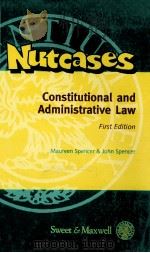
- Constitutional and administrative law
- 1997 Sweet & Maxwell
-
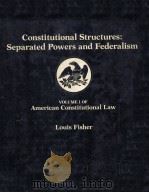
- American constitutional law
- 1990 McGraw-Hill
-
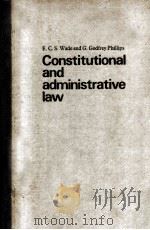
- CONSTITUTIONAL AND ADMINISTRATIVE LAW NINTH EDITION
- 1977 LONGMAN
-

- AMERICAN CONSTITUTIONAL LAW
- 1990年 MCGRAW-HILL PUBLISHING COMPANY
-
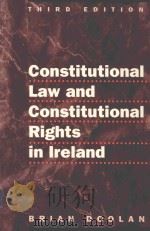
- Constitutional law and constitutional rights in Ireland
- 1987 Gill & Macmillan
-
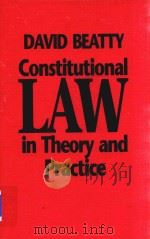
- Constitutional Law in Theory and Practice
- 1995 University of Toronto Press
-
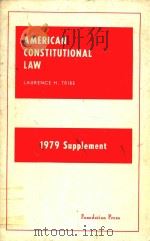
- AMERICAN CONSTITUTIONAL LAW
- 1979 FOUNDATION PRESS
-
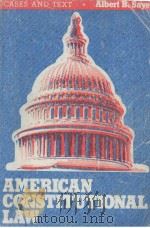
- AMERICAN CONSTITUTIONAL LAW CASES AND TEXT
- 1979 WEST PUBLISHING CO.
-
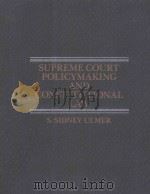
- SUPREME COURT POLICYMAKING AND CONSTITUTIONAL LAW
- 1986 MCGRAW-HILL BOOK COMPANY
-

- Constitutional and administrative law
- 1982 MacDonald and Evans
提示:百度云已更名为百度网盘(百度盘),天翼云盘、微盘下载地址……暂未提供。➥ PDF文字可复制化或转WORD



